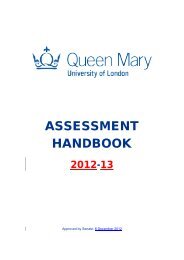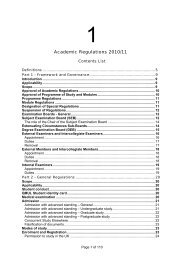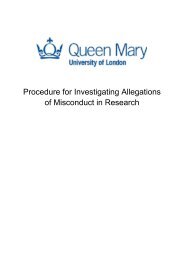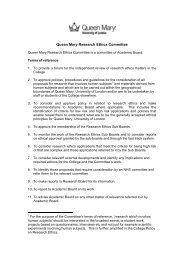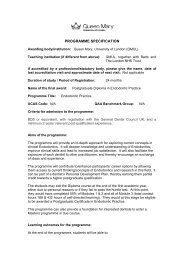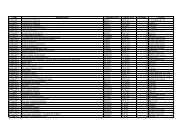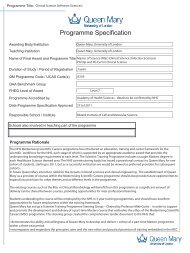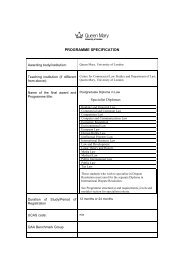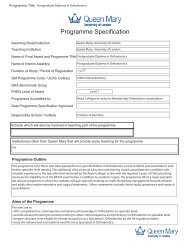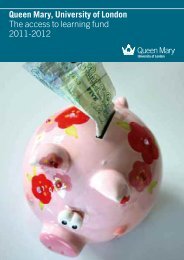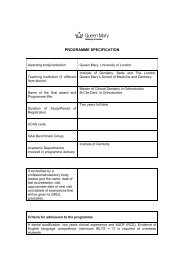F303 - Queen Mary University of London
F303 - Queen Mary University of London
F303 - Queen Mary University of London
You also want an ePaper? Increase the reach of your titles
YUMPU automatically turns print PDFs into web optimized ePapers that Google loves.
<strong>F303</strong> (PHYSICS) PROGRAMME SPECIFICATION<br />
1. Awarding body/institution: <strong>Queen</strong> <strong>Mary</strong>, <strong>University</strong> <strong>of</strong> <strong>London</strong><br />
2. Teaching institution: <strong>Queen</strong> <strong>Mary</strong>, <strong>University</strong> <strong>of</strong> <strong>London</strong><br />
<strong>University</strong> College <strong>London</strong><br />
King’s College <strong>London</strong><br />
Royal Holloway, <strong>University</strong> <strong>of</strong><br />
<strong>London</strong><br />
3. Programme accredited by: Institute <strong>of</strong> Physics (2000); next visit<br />
2005/06; an accredited Degree with<br />
suitable additional pr<strong>of</strong>essional<br />
experience can lead to Chartered<br />
Physicist or Chartered Engineer<br />
Status.<br />
4. Final Award: MSci<br />
5. Programme title: Physics<br />
6. UCAS code: <strong>F303</strong><br />
7. QAA Benchmark Group: Physics, astronomy and astrophysics<br />
8: Criteria for admission: Normally three A-levels with a<br />
minimum <strong>of</strong> 320 points. This must<br />
include 220 points in Physics and<br />
Mathematics with a minimum <strong>of</strong><br />
grade B.<br />
9. Aims <strong>of</strong> the programme:<br />
For all programmes which we <strong>of</strong>fer we aim to:<br />
i. teach physics <strong>of</strong> high quality within an excellent research environment;<br />
ii.<br />
iii.<br />
iv.<br />
recruit students able to benefit from a university education;<br />
provide programmes that enable students with a variety <strong>of</strong> educational backgrounds to<br />
pursue programmes in physics as a single subject as well as in physics combined with<br />
other natural and applied sciences;<br />
provide access to such variety <strong>of</strong> courses, including those from other disciplines, as to<br />
enable students to tailor their studies to their own needs and interests;<br />
v. instil in students an understanding <strong>of</strong> the working <strong>of</strong> the physical world;<br />
vi.<br />
encourage students to develop transferable skills that are applicable to a variety <strong>of</strong><br />
careers;<br />
vii. provide programmes that prepare students, where appropriate, for a range <strong>of</strong> pr<strong>of</strong>essional<br />
careers in physics.
viii. provide opportunities for students to appreciate the beauty <strong>of</strong> physics and to develop a<br />
desire for learning.<br />
10. Learning outcomes for the programme:<br />
As with our aims all MSci programmes share a set <strong>of</strong> common learning outcomes. A student<br />
graduating with an MSci should:<br />
i. have acquired a core knowledge <strong>of</strong> physics, possibly coupled with experience <strong>of</strong><br />
another pure or applied science;<br />
ii.<br />
be able to communicate this knowledge;<br />
iii.<br />
iv.<br />
have acquired essential skills in the use <strong>of</strong> computers for word-processing,<br />
spreadsheet computing and the acquisition and manipulation <strong>of</strong> data, in measurement<br />
and the analysis <strong>of</strong> uncertainties <strong>of</strong> observation, in the use <strong>of</strong> high-level computer<br />
languages, in the art <strong>of</strong> scientific report-writing and in the oral presentation <strong>of</strong><br />
technical material;<br />
be able to apply scientific methods to the analysis <strong>of</strong> problems;<br />
v. have seen and understood the application <strong>of</strong> core physics to one or two specialised<br />
areas <strong>of</strong> study;<br />
vi.<br />
vii.<br />
viii.<br />
ix.<br />
have acquired an understanding <strong>of</strong> the workings <strong>of</strong> the physical world;<br />
be able to appreciate the rôle <strong>of</strong> science in general, and <strong>of</strong> physics in particular,<br />
within a broader range <strong>of</strong> human cultural activity.<br />
be fluent in the language and methods <strong>of</strong> physics;<br />
be able to apply core physics to the understanding <strong>of</strong> phenomena in specialised areas<br />
<strong>of</strong> study;<br />
x. be able to plan and execute a small research project;<br />
xi.<br />
xii.<br />
be able to apply acquired knowledge and skills to the modelling <strong>of</strong> new problems in<br />
physics;<br />
be equipped for a pr<strong>of</strong>essional career based on physics.<br />
An MSci graduate should be able to enter further training at PhD level and to become a pr<strong>of</strong>essional<br />
physicist. S(he) should in addition be able to enter any <strong>of</strong> a number <strong>of</strong> other careers which use the<br />
transferable skills gained in the four year programme <strong>of</strong> study.<br />
11. Teaching, learning and assessment strategies:<br />
Our programmes are constructed within a modular course structure in which each student takes eight<br />
course units (modules) per year. Our overall strategy is to achieve a balance, appropriate to the aims <strong>of</strong><br />
each course unit, between teaching (lectures; practical laboratory work; small-group tutorials) and<br />
learning by students (peer discussion; exercise classes; coursework and essay assignments; independent<br />
work in laboratories and computer studies; teach-yourself computer packages and the Internet; videos;<br />
textbooks and supplementary reading).<br />
Compulsory tutorials, exercise classes or laboratories, are provided for all core courses: tutorials are<br />
used to reinforce students’ knowledge and understanding in conceptually challenging courses, such as<br />
those on quantum and statistical physics, whilst exercise classes are used to develop the specific skills<br />
needed in courses such as Electric and Magnetic Fields. Two general physics laboratories are used to<br />
develop experimental skills, including the acquisition <strong>of</strong> data and the analysis <strong>of</strong> uncertainties <strong>of</strong><br />
observation. In addition students learn to write a scientific account <strong>of</strong> their experimental observation.<br />
Finally, review and experimental projects are used to develop students' investigative skills.
Assessment is by a mixture <strong>of</strong> continuous assessment and formal written examinations at the<br />
end <strong>of</strong> each year. We use a variety <strong>of</strong> in-course assessments to enable students to get quick<br />
feedback as to their performance. These include weekly coursework (marked and returned on<br />
a weekly basis), essay assignments, mid-term tests carried out in a lecture slot, performance in<br />
exercise classes and tutorials, laboratory and project reports. These in-course assessments are<br />
combined with formal final written examination results and oral examinations (on project<br />
reports) to produce the final mark for each course unit. The precise mixture <strong>of</strong> in-course and<br />
final exam marks to give the overall mark varies between different course units and is<br />
specified in the detailed course unit description given in the Student Handbook (see below).<br />
12. Programme structure and requirements, levels and courses:<br />
Each programme we <strong>of</strong>fer is made up <strong>of</strong> a mixture <strong>of</strong> compulsory core units (C) common to<br />
most programmes, a set <strong>of</strong> units required (R) for a specific programme and suggested (S)<br />
units which <strong>of</strong>fer a range <strong>of</strong> choice to the student depending upon his/her interests and<br />
aptitudes. Our MSci Degree programme is unique in having an intercollegiate fourth year <strong>of</strong><br />
study. The course units available in the fourth year are planned and delivered jointly by the<br />
Physics Departments at <strong>Queen</strong> <strong>Mary</strong>, <strong>University</strong> College, King’s College and Royal<br />
Holloway. Thus the fourth year has a rich choice <strong>of</strong> courses which cover not only physics,<br />
but theoretical physics, asrophysics and applied physics. There is a fourth year project which<br />
lasts throughout the academic year and counts for a quarter <strong>of</strong> the final year marks. The first<br />
three years are taught entirely at the <strong>Queen</strong> <strong>Mary</strong> campus while in the fourth year students<br />
will do their project at <strong>Queen</strong> <strong>Mary</strong> but may attend lectures in central <strong>London</strong> as well as at<br />
<strong>Queen</strong> <strong>Mary</strong>. We have a detailed four-year plan for each MSci programme and for <strong>F303</strong> it<br />
may be seen at the web address<br />
http://www.ph.qmul.ac.uk/ughandbook/f303.shtml<br />
In addition for each course unit (module) in the first three years there is a detailed description<br />
including the syllabus, the recommended textbook and the forms <strong>of</strong> assessment. This may be<br />
accessed via the undergraduate student handbook at<br />
http://www.ph.qmul.ac.uk/ughandbook/courses.htm<br />
For the fourth year there are course unit descriptions with syllabuses at<br />
http://www2.rhbnc.ac.uk/%7Euhap027/MSci/<br />
13. Quality assurance and enhancement:<br />
Each student enters the Department via the College Induction Process plus a Physics<br />
Department Induction. Each student is assigned to a personal tutor who acts throughout the<br />
student’s Degree studies to help with choice <strong>of</strong> modules and with any problems that may<br />
affect a student’s studies. Teaching and Learning policy is decided by a Departmental<br />
Teaching Committee on which sit all the programme organisers. To assess how well our<br />
policy is implemented we have a variety <strong>of</strong> feedback mechanisms. There is a Student Staff<br />
Liaison Committee (SSLC) which meets once per term to consider student concerns and to<br />
monitor the results <strong>of</strong> student questionnaires circulated in each course unit. The Staff<br />
Convenor <strong>of</strong> the SSLC sits on the Teaching Committee and reports back student views and<br />
suggestions. Each course organiser submits a report on his/her course after the final<br />
examination which is considered by the Teaching Committee. Programmes <strong>of</strong> study are<br />
subject to review on an annual basis.
14. Transferable skills and employment possibilities:<br />
Almost all MSci graduates go on to further specialist study <strong>of</strong> Physics at PhD level but they<br />
may easily enter a range <strong>of</strong> other career paths that use the transferable skills gained in the<br />
MSci programme <strong>of</strong> study. These employment areas include teaching at secondary or tertiary<br />
level, management, finance, IT and journalism. All physics graduates with reasonable<br />
Degrees are highly employable because <strong>of</strong> the skills they gain in their studies. The most<br />
important <strong>of</strong> these skills are numeracy, familiarity with computers and IT, problem-solving<br />
skills, ability to carry out measurement and observation and to analyse the results there<strong>of</strong>, the<br />
ability to write technical reports and the ability to give oral presentations <strong>of</strong> scientific<br />
arguments.<br />
Person Completing Programme Specification Dr. R. B. Jones<br />
Person responsible for management <strong>of</strong> programme Dr. K. J. Donovan<br />
Date programme specification agreed by Department June 2004<br />
or teaching and learning committee<br />
Date <strong>of</strong> completion <strong>of</strong> programme specification: June 2004<br />
Date <strong>of</strong> approval by Faculty Board/EB:<br />
NA<br />
Date <strong>of</strong> update/amendment: June 2004



